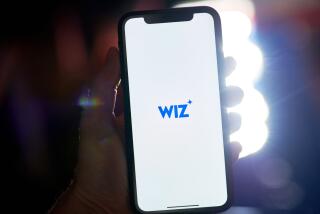Agencies Slow in Approving Time Warner, AOL Merger
- Share via
WASHINGTON — Federal regulators are dragging their feet on approving America Online Inc.’s proposed acquisition of Time Warner Inc. Concerned that the merged company could limit consumer access to high-speed Internet connections, the regulators want AOL to make concessions to protect consumers in that market before approving the deal.
AOL is unlikely to let the deal unravel and could reach an accord with regulators within several weeks, sources say.
An official at the Federal Trade Commission, which is reviewing the deal along with the Federal Communications Commission, confirmed that the FTC is concerned that in some markets where Time Warner operates cable systems there are no competing providers of high-speed Internet access through cable TV lines.
To counter any anti-competitive effects of uniting the nation’s largest Internet access provider with the world’s biggest entertainment company, the FTC is considering forcing Time Warner to open its cable lines, say staffers close to the case. Cable TV lines can deliver telephone and digital video as well as Internet access at speeds up to 100 times faster than ordinary analog phone lines. High-speed cable is viewed as a key technology to deliver broadband Internet access and interactive TV to consumers’ homes.
The FTC may also require Time Warner to sever its financial ties with the nation’s largest cable operator--AT&T; Corp.--which has a 25% limited-partnership interest in Time Warner Entertainment, which holds Warner Bros., Time Warner Cable and other entertainment units.
Though the staff objections are stronger than antitrust experts anticipated when the companies announced their deal eight months ago, the concessions sought by the government don’t appear to undermine the financial foundation of the deal in the way a forced asset sale might. Thus, even opponents of the deal expect the government and AOL to work out a compromise.
“My impression from watching Steve Case and AOL is that they will work this out,” said Gene Kimmelman, co-director of the Washington office of Consumers Union, who has lobbied hard for open cable access. “It’s hard for me to see the company being as belligerent as, say, Microsoft.”
Tim O’Rourke, an uninvolved Washington antitrust lawyer, said, “Given that what we are talking about here are issues of behavior rather than divesting huge assets, it is much more likely the deal will go through.”
Consumer groups and industry opponents such as Walt Disney Co. have made considerable headway against AOL’s proposed purchase of Time Warner since they first raised concerns last winter about the deal’s potential to foster increased media concentration. The groups argued that a union of AOL and Time Warner could undermine standards for the increasingly essential tools of the Information Age, such as e-mail, instant messaging, appointment scheduling and electronic programming guides.
Those complaints have the attention of the FTC’s cerebral chairman, Robert Pitofsky--a 69-year-old antitrust scholar and former dean of Georgetown University Law School. Pitofsky is directly involved in the review of the case. He is said to be eager to test his pet theory that antitrust laws must not only protect competition in the marketplace for goods but also in the marketplace of ideas.
The key sticking point in resolving the dispute revolves around the scope of open access that AOL-Time Warner must provide and to whom they must provide it. The companies don’t want to be designated “common carriers” like phone companies and, thus, be required to open their networks to all comers. Citing their finite network capacity, and current legal authority to choose what video programming they carry, the companies say the government should let the marketplace work out the details of open access case by case.
At a congressional hearing in February, for instance, AOL Chairman Case and Time Warner Chairman Gerald Levin pledged to open their high-speed network to others. But the two officials said the government should not mandate open access and argued that what mattered was their personal commitment to open access.
However, some consumer groups have been pushing for the FTC to order open access and give independent Internet access providers such as Atlanta-based EarthLink Inc. and Prodigy Communications Corp. of White Plains, N.Y., the right to sue AOL-Time Warner if such access is not given.
The FTC is unlikely to go that far. But it may require AOL-Time Warner to open their networks to competing ISPs in markets where there are no other cable TV providers offering high-speed Internet access.
The FTC’s objections to the AOL-Time Warner deal became public after agency staffers met with AOL and Time Warner officials last week.






